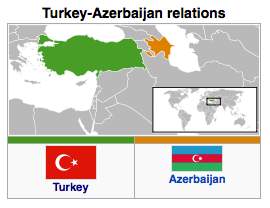TANAP Project Taking Shape
By JTW
By Sinem Vardaryildiz
The Caspian Oil and Gas Conference was held in Baku, early in June. During the conference, the representatives of U.S. brought up the possibility of transiting Turkmen gas through the Trans-Anatolian Gas Pipeline (TANAP). The idea of including Turkmen gas was recently repeated by Turkish Energy Minister Taner Yıldız, during a visit to Turkmenistan on September 3rd. Just after Yıldız remarked “we are a candidate to buy Turkmen gas” in Ashgabat, the European Commissioner for Energy, Gunther Oettinger, met with governmental representatives of Azerbaijan, Turkey, and Turkmenistan.
Recent developments have made tremendous impact in the global energy market, but the biggest critic came from the President of the National Iranian Gas Company, Hossein Bidarmaghz. Bidarmaghz, who in a speech to Tehran Times stated that Turkmenistan’s possibility of joining TANAP is very low, declared that Iran and Russia would not allow a building of any natural gas pipeline in the Caspian Region.
Even though this situation brings the Caspian’s status issue once more on the agenda, Ankara and Baku continue with the negotiations without losing speed.

The second Turkey-Azerbaijan High Level Strategic Cooperation Council, the first of which was held last year in Izmir, being held at the same time as the International Pipeline & Offshore Contractors Association in Istanbul, increased interest in the TANAP Project even more. In addition, this huge 7 Billion Dollar project, of which an 80% share belongs to SOCAR, and the remaining 20% share to BOTAŞ and TPAO, is being restructured. As the SOCAR President Rovnag Abdullayev has also declared, the Azerbaijani oil company is preparing to sell 29% of its share to the ShahDeniz Consortium partners BP, Total and Statoil. It is planned that the transfer of shares will end until the end of 2013, and that a new line will be build parallel to the existing lines.
The Trans-Anatolian pipelines construction will be completed in three stages. In the first stage, 6bcm of the line, which will be working with the capacity of 16bcm, will be sold to Turkey, and the rest will be sold to Europe. The capacity increase, which will be realized in stages with gas that will be extracted from the Azeri Çıralı, Güneşli and Absheron fields, TANAP’s capacity will be increased to 3bcm.
The European Union leans toward any alternative to reduce its dependency on Russian natural gas without compromising the Europe’s energy supply security. With the realization of the TANAP project, which aimed to transport the Azeri natural gas via Turkey to Europe, Union will contribute to diversify European energy suppliers and routes on a remarkable way. In addition, despite being one of the shareholders of the Nabucco project, Turkey’s decision to act jointly with Azerbaijan to satisfy European natural gas demand, presents an opportunity for Ankara to shield itself from being exposed to the EU’s “rules”. However, if TANAP Consortium’s headquarters would be based in the Netherlands as is planned, the possibility for Turkey to become a regional energy center weakens because of the loose of political ground.
